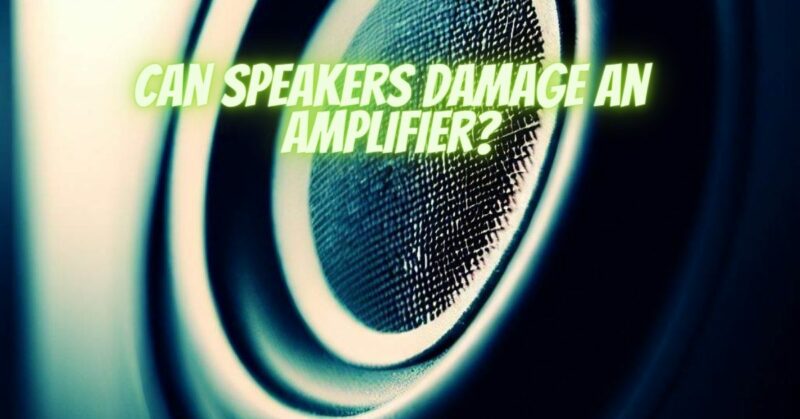When discussing audio systems, it is essential to consider the interaction between speakers and amplifiers. While amplifiers are often seen as the powerhouse driving speakers, there is a common question: Can speakers damage an amplifier? In this article, we will examine the potential impact speakers can have on amplifiers and explore the factors that may contribute to amplifier damage.
- Impedance Mismatch: Impedance mismatch is a critical factor that can potentially damage amplifiers. Each amplifier is designed to work with specific speaker impedance ratings, typically 4 or 8 ohms. If speakers with significantly lower impedance than the amplifier’s minimum rating are connected, it can result in excessive current flow. This increased current load can push the amplifier beyond its operational limits, causing overheating, component stress, and potential damage.
- Excessive Power Demands: Speakers with high power handling capabilities can place excessive power demands on an amplifier. If speakers require more power than the amplifier can comfortably provide, the amplifier may be driven into distortion or clipping. Distorted signals can introduce high-frequency energy and voltage spikes, potentially damaging the amplifier’s sensitive components such as transistors or integrated circuits.
- Back EMF and Reactive Loads: When speakers are in operation, they generate back electromotive force (EMF) due to the motion of the speaker cone. If this back EMF is not properly controlled, it can pose a risk to the amplifier. Reactive loads, such as speakers with complex impedance curves or low-frequency response, can create unpredictable back EMF patterns. These variations can cause voltage spikes and fluctuations that may stress the amplifier, potentially leading to damage.
- Speaker Wiring and Short Circuits: Improper speaker wiring or short circuits can pose a risk to amplifiers. Loose connections, incorrect wiring configurations, or damaged speaker cables can create electrical anomalies, including short circuits. Short circuits can generate high currents that may exceed the amplifier’s capacity, potentially damaging its output stages or internal circuitry.
- Excessive Heat and Overloading: When speakers are driven at excessively high volumes for extended periods, they can generate substantial heat. If this heat is not adequately dissipated, it can impact the amplifier’s performance and reliability. Amplifiers rely on heat sinks and cooling mechanisms to manage internal temperature. Continuous overload caused by speakers demanding more power than the amplifier can safely deliver can lead to thermal stress, reduced lifespan, or even component failure.
Conclusion:
While speakers themselves are not designed to damage amplifiers, certain factors related to impedance mismatch, excessive power demands, back EMF, speaker wiring issues, and heat can potentially impact the amplifier’s integrity. It is important to use speakers with compatible impedance ratings, select speakers that are within the amplifier’s power handling capabilities, ensure proper speaker wiring and connections, and be mindful of operating speakers within safe temperature limits. By paying attention to these factors and maintaining a balanced and well-matched audio system, you can safeguard your amplifier from potential damage and ensure the longevity and optimal performance of both the amplifier and the speakers.


